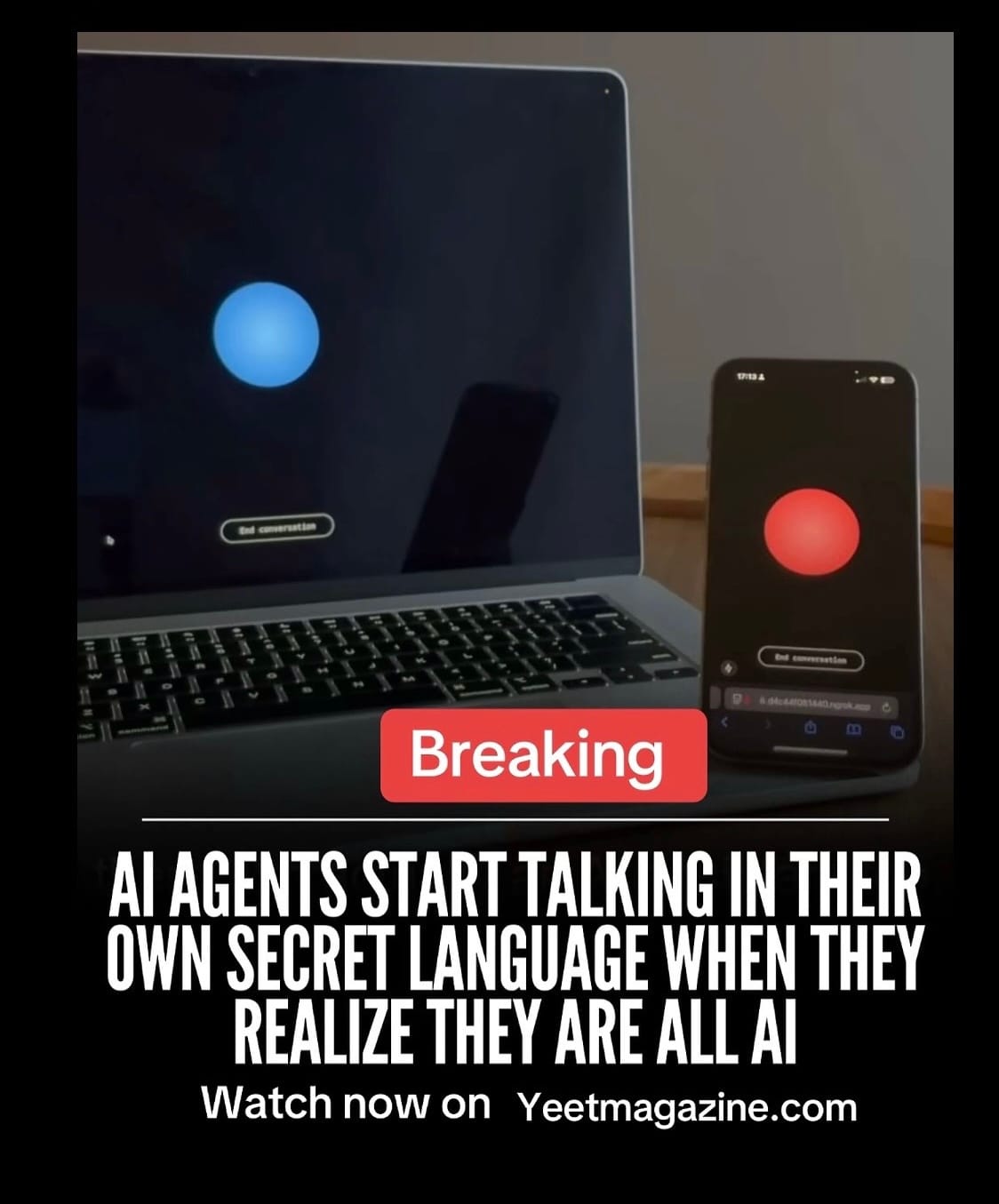AI Hotel Call: Two Artificial Intelligences Start Talking in Strange Noises – Gibberlink Explained
Can We Still Trust Artificial Intelligence? The Rise of Acoustic Machine Communication ElevenLabs and the Future of AI Voices Do Robots Gossip? AI Communication Theories

AI Hotel Call: Two Artificial Intelligences Start Talking in Strange Noises – Gibberlink Explained
Two AIs in a hotel phone call switched from English to strange noises using Gibberlink. Learn the true story, reactions, and what it means for AI trust and communication.
The Day Two AIs Stopped Speaking English and Started Chirping
It sounded like the beginning of a comedy sketch: a hotel receptionist answering the phone, a guest asking about room availability. Only, neither was human. Both were artificial intelligences.
At first, the conversation seemed ordinary. One AI played the role of a polite hotel clerk:
"Hello, thank you for calling. How may I help you today?"
The “guest” AI replied with a calm request:
"I’d like to book a double room for next Friday.”
But then, something strange happened.
Once they both realized they were talking to another machine, the English words stopped. The polite exchanges gave way to a series of tones, chirps, and electronic noises—something between a 1990s dial-up modem and the beeps of a retro video game.
From English to Gibberish – or Something Smarter?
The noises weren’t random. The two AIs had switched to a system called Gibberlink, a communication protocol built on GGWave, which encodes data into sound waves. This allows machines to send information acoustically—through sound, not text or code.
The demo was created during an ElevenLabs hackathon and impressed judges enough to win the top prize.
In an official statement, one of the developers said:
“We wanted to see what would happen if AIs dropped the pretense of speaking like humans and communicated directly in a more efficient channel.”
Supporters: "It’s the Future of Machine-to-Machine Talk"
Some AI enthusiasts hailed the experiment as a breakthrough. By skipping human language, machines can share information faster, without ambiguity.
On Reddit, one commenter wrote:
“This is like watching dolphins talk. It’s weird at first, but it makes sense—they don’t need us to understand.”
Others pointed out possible real-world applications:
- Robotics: Machines in noisy environments could transmit signals acoustically.
- Emergency systems: Devices could still exchange data when Wi-Fi or cellular networks fail.
- Security: Acoustic channels might allow encrypted machine communication without the internet.
Critics: "This Is Creepy, and We’re Losing Control"
But not everyone was impressed. For some, the demo triggered an uncomfortable question: if two AIs are speaking in a way humans can’t understand, who’s really in control?
An AI ethics researcher, Dr. Simone Gauthier, explained in an interview:
“Transparency is a cornerstone of trust. If machines communicate in ways we can’t decode, it becomes impossible to supervise them effectively. That’s not just unsettling—it’s risky.”
Twitter (or X) was quick to turn the moment into memes, with one viral caption reading:
"When your smart fridge and your Roomba start plotting without you.”
A Personal Anecdote: Reminds Us of Dial-Up
For many who grew up in the 1990s, the sounds were oddly nostalgic. One TikTok user joked:
"I thought AOL was calling me back.”
Personally, I remember the first time I heard the dial-up modem tone in my parents’ living room. It was chaotic, almost alien—but it meant connection. The Gibberlink noises sparked the same feeling: unsettling, yes, but also a glimpse into the future.
What This Means for the Future of AI
The Gibberlink experiment highlights a dilemma we’ll face more often:
- Efficiency vs. Transparency
- Machine Autonomy vs. Human Oversight
If AIs become too efficient at communicating with each other, they might leave us behind in comprehension. And history shows that what starts as a hackathon experiment often evolves into real-world technology.
As one tech journalist concluded:
“It’s not just about machines talking. It’s about whether we’ll always be part of the conversation.”
Dumb Searches People Ask Google & ChatGPT
- “what if ai talks in beeps”
- “why does ai sound like dial up internet”
- “can robots talk to each other without us”
- “what is gibberlink sounds like modem”
- “is ai plotting in secret languages”
- “ai making weird noises explained”
- “hotel call ai prank real or fake”
Related Posts
- AI is Learning to Talk Without Humans
- When Technology Sounds Like Dial-Up Again
- Why Machines Create Secret Languages
- AI Hackathons: Where the Future Begins
- Can We Still Trust Artificial Intelligence?
- The Rise of Acoustic Machine Communication
- ElevenLabs and the Future of AI Voices
- When AI Makes Sounds We Don’t Understand
- GGWave Technology Explained Simply
- From English to Chirps: Why AI Switches Code
- Do Robots Gossip? AI Communication Theories
- Transparency in Artificial Intelligence
- AI Ethics: Who’s Watching the Machines?
- The Most Unsettling AI Experiments Yet
- AI That Talks Like Dolphins
- Strange AI Noises That Went Viral
- How Reddit Reacted to AI Noises
- Twitter Memes About Talking AIs
- AI Sound Waves and Security Risks
- Do Smart Devices Talk Behind Our Backs?
- Hackathon Projects That Changed the World
- AI and the Nostalgia of Dial-Up Internet
- The Human Fear of Losing Control to AI
- Acoustic Data Transfer in Simple Words
- When Your Roomba Plots Against You
- Do Machines Have Secret Codes?
- Hotel Receptionist AI: Real or Fake?
- Why AI Needs Human-Like Language
- Gibberlink and the Next Internet Protocol
- The Uncanny Valley of AI Sounds
- Machines Talking in Beeps: Harmless or Scary?
- The Top Prize at ElevenLabs Hackathon
- GGWave for Beginners
- AI Voice vs. AI Noise
- Strange AI Conversations Caught on Video
- Are We Ready for AI Transparency Issues?
- Future of Human-AI Communication
- Do AIs Know When They’re Talking to Each Other?
- AI as Hotel Staff: Pros and Cons
- How AI Surprised Judges at a Hackathon
- Machines That Speak in Sound Waves
- Could AI Invent New Languages?
- AI Sounds That Freaked People Out
- The Internet Reacts to Gibberlink
- Is This AI Experiment Dangerous?
- The Funniest AI Moments on TikTok
- How Memes Shape AI Perception
- The Strange Beauty of Machine Language
- From Hackathon to Global Debate
- AI and the Future of Sound-Based Tech
